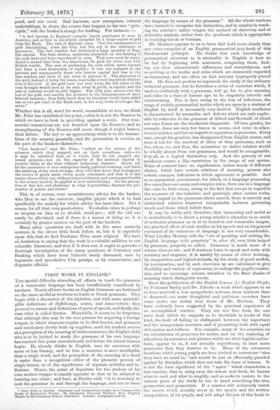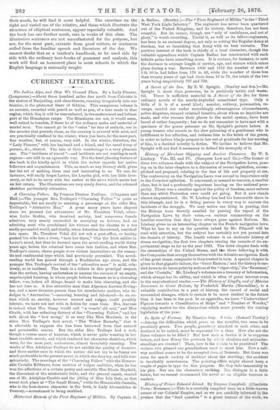FIRST WORK IN ENGLISH.• THE special difficulty attending all efforts
to teach the grammar of a vernacular language has been insufficiently considered by teachers. Nearly all text-books on English Grammar are fashioned on the same model as treatises on Latin or Greek grammar. They begin with a discussion of the alphabet, and with some unintelli- gible definitions of diphthongs, mutes, and semi-vowels ; they proceed to names and definitions of parts of speech, and finally dis- cuss what is called Syntax. Meanwhile, it seems to be forgotten that although this may be the true process for acquiring a foreign tongue, in which elements require to be first known, and grammar and vocabulary slowly built up together, until the student arrives at a perception of the meaning of entire sentences, the English child who is to be invited to study the grammar of his own language has reached this point unconsciously and before his school-lessons begin. He already thinks in English, uses its resources with more or less fluency, and to him a sentence is more intelligible than a single word, and the perception of the meaning of a word is easier than a recognition either of the phonetic powers of single letters, or of the significance of separate syllables and in- flexions. Hence, the point of departure for the student of his own mother-tongue is exactly opposite to that to be adopted in learning any other ; and here, as Herder said, " it is necessary to seek the grammar in and through the language, and not to learn
* First Work in English. Grammar and Composition taught by a Comparative Study of Equivalent Forma. By Alexander Falconer Murison, M.A., English Master in the Grammar School, Aberdeen. London : Longman and Co.
' the language by means of the grammar." All the wisest teachers have learned to recognise this distinction, and to employ in teach- ing the scholar's native tongue the method of discovery and of inductive analysis, rather than the synthesis which is appropriate in teaching Greek or German.
Mr. Murison appears to us to have laid hold more clearly than any other compiler of an English grammatical text-book of this fundamental principle. He thinks that such knowledge of grammatical structure as is attainable in ' English is best to be had by beginning with sentences, comparing them, find- ing out their characteristic differences and resemblances, and so arriving at the truths and rules which are commonly regarded as elementary, and are often on that account improperly placed first. He does not profess to supersede the study of the ordinary technical grammar, but he furnishes a series of exercises which, if used co-ordinately with a grammar, will go far to give meaning and value to a class of lessons apt to be singularly infertile and uninteresting. For, in fact, owing to the loss of inflexions, the range of strictly grammatical truths which are open. to a student of English by itself is necessarily very limited. English accidence is characterised by anomalies and defects which are only explic- able by reference to the grammar of Alfred and Beowulf, of which our own forms are the incoherent fragments. Of true gender, for example, there are very few traces in nouns, and none in adjec- tives or articles, and but an imperfect expression in pronouns. Every case, except the genitive, has disappeared from English nouns, and were it not for the survival of three or four pronouns, such as Mm, whom, we, and them, the accusative or dative relation would be wholly absent from our grammars, and would be recognisable, if at all, as a logical distinction only. And the poverty of our accidence causes a like restriction in the range of our syntax. Rules of concord have no signification, unless words of different classes, which have certain relations of meaning, possess also certain common inflexions in which agreement is possible. And as to syntactical government, for which, in a language possessing five cases there are many and complex rules, there can in a language like ours be little room, owing to the fact that except in regard to the sequence of the infinitive and participle after certain verbs, and in regard to the pronouns above named, there is scarcely any syntactical relation whatever recognisable between governing words and those which follow them.
It may be safely said, therefore, that interesting and useful as it undoubtedly is to direct a young scholar's attention to so much of technical grammar as is to be found in our vernacular tongue, the practical effect of such studies on his speech and on his general command of the resources of language is not very considerable. What Lindley Murray calls the "art of speaking and writing the English language with propriety" is, after all, very little helped by grammar, properly so called. Grammar is much more of a science than an art ; and if students learn to speak and write with accuracy and elegance, it is mainly by means of other training, by composition and logical analysis, by the study of good models, by conversation, and by such exercises as are calculated to give flexibility and variety of expression, to enlarge the pupil's vocabu- lary, and to encourage minute attention to the finer shades of meaning which distinguish words.
Since the publication of the English Lessons for English People, by Professor Seeley and Dr. Abbott—a book which appears to us to have received a less sympathetic welcome from teachers than it deserved—no more thoughtful and judicious exercises have come under our notice than those of Mr. Murison. They have evidently been suggested by the practical experience of an accomplished teacher. They are not free from the one main fault which we suppose to be inevitable in books of this kind, the fault of failing to distinguish between the important and the unimportant exercises, and of presenting both with equal elaboration and fullness. For example, many of the exercises on the substitution of pronouns for nouns, and on the replacing of adjectives by sentences and phrases which are their logical equiva- lents, appear to us, if not actually superfluous, at least more numerous than they deserve to be. Many of the erroneous locutions which young pupils are here invited to correct are "sins they have no mind to," and would be just as effectually guarded against by discipline which does not take the form of lessons. It is not the least significant of the " notes " which characterise a true teacher, that in using even the wisest text-book, he knows what to omit and what to amplify, and so seeks to restore to the various parts of the study he has in hand something like true perspective and proportion. If a teacher will sedulously watch the errors which actually occur in the speech and the written compositions of his pupils, and will adapt the`fuse of this book to
their needs, he will find it most helpful. The exercises on the right and varied use of the relative, and those which illustrate the structure of elliptical sentences, appear especially valuable. And the book has one further merit, rare in works of this class. The illustrative sentences are not manufactured for the purpose, but are, for the most part, extracts from good writers, or sentences culled from the familiar speech and literature of the day. We cannot doubt that as a teacher's handbook, to be used side by side with the ordinary text-books of grammar and analysis, this work will find an honoured place in most schools in which the English language is rationally taught.



































 Previous page
Previous page